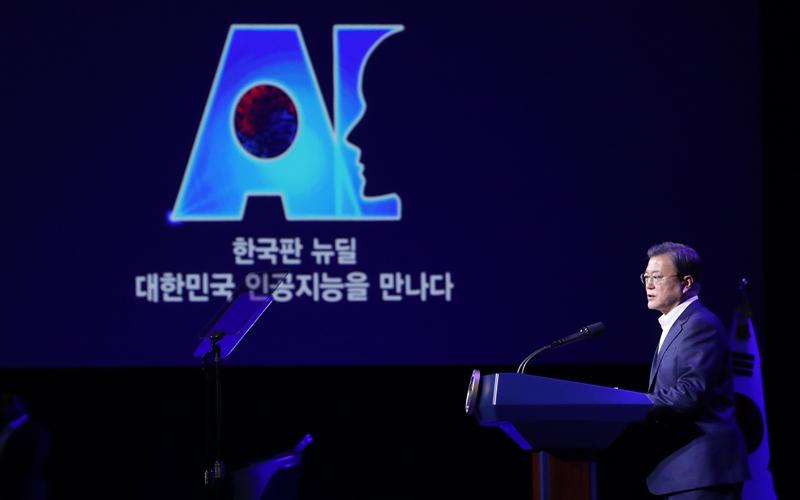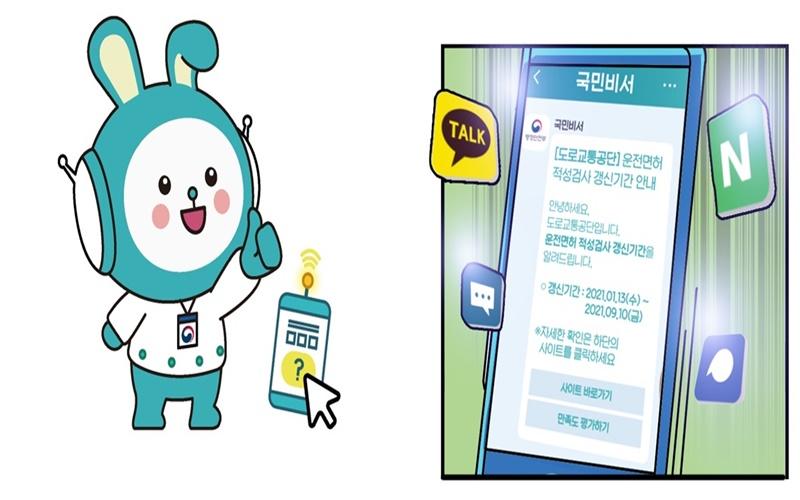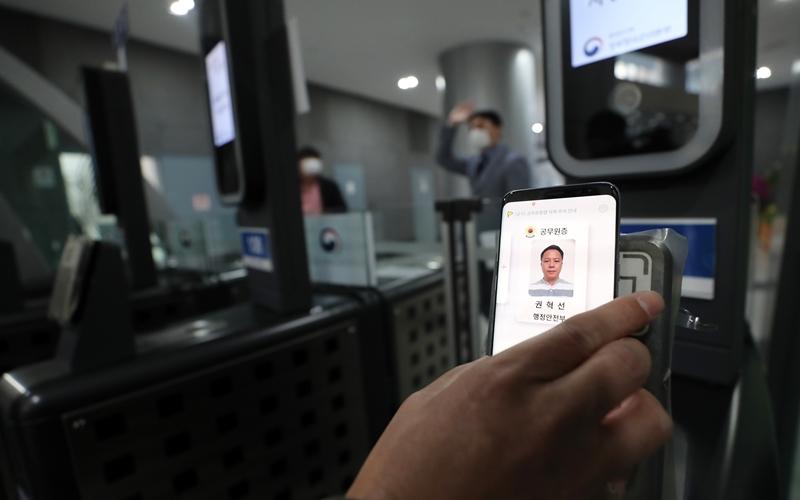
An "AI (artificial intelligence) government," one of the ten leading tasks of the Korean New Deal, aims to provide non-contact and customized public services through new technologies and digital infrastructure to create a smart work environment in the public sector. The photo shows President Moon Jae-in speaking at an event hosted by Korea International Exhibition Center (KINTEX) in Goyang, Gyeonggi-do Province, to mark the Korean New Deal and AI in November 2020. (Yonhap News)
By Lee Jihye and Yoon Sojung
Scenario 1
A man gets his first shot of a COVID-19 vaccine. He is so nervous that he forgets the precautions given to him by medical staff at the time of his shot. Though perplexed, he receives a text message on his smartphone from the so-called Virtual Assistant Service for the Public, or GoodPy for short, a mobile service developed by the Ministry of the Interior and Safety. The message contains detailed information on getting the second shot and offering proof of the first.
Scenario 2
A civil servant has a meeting at Government Complex-Sejong, but realizes that he forgot his company ID card just 10 minutes before the event. Without the card, he cannot make it to the meeting on time because of strict security regulations. But he remembers hearing from his co-workers about a mobile ID for civil servants. He receives such an ID through a smartphone app and uses to enter his building. The door opens and he makes it to the meeting on time.
AI gov't: changing people's daily life
Administrative services have lately grown far more accessible by the public. People can verify their IDs anytime and anywhere through their smartphones or apply for civil services and receive the results at home without having to visit a community service center.
These are among changes from the Korean New Deal, which was announced by the government in July last year. The initiative is a national development campaign in which the government aims to recover from the COVID-19 pandemic and lead the global economy. The plan is to inject KRW 160 trillion by 2025 to create 190,000 jobs in future industries.
On the first anniversary of the initiative's announcement on July 14, President Moon Jae-in said, "At first, it began as a strategy to create a large number of jobs to respond to the COVID-19 crisis, focusing on the Digital New Deal."
"The Korean New Deal started to evolve in earnest with the Green New Deal established as one more support column – with the aim of accelerating climate change responses and the transition to a low-carbon economy."
"Proactive fiscal investments have served as a pump primer, becoming a driving force for change," he added. "The private sector's participation is also gaining momentum."
As one of the ten leading tasks of the Korean New Deal, the AI government seeks to provide customized public services in a non-contact manner based on new technologies and digital infrastructure to create a smart work environment for the public sector.

The so-called Virtual Assistant Service for the Public, or GoodPy for short, is a mobile app developed by the Ministry of the Interior and Safety to quickly provide customized administrative services. The image shows the GoodPy mascot and how the app works on a smartphone.
The first case is GoodPy, a shortened name for the mobile app Virtual Assistant Service for the Public. Introduced in March this year, this app offers administrative services customized for individuals.
As a de facto personal assistant, the app sends text messages or useful information to users like those on getting vaccinated, renewing a driver's license, paying traffic fines or going for medical checkups.

Staff at central government organizations can download mobile ID cards on their smartphones, a function launched in the first half of this year. The photo shows a civil servant using his mobile ID to enter Government Complex-Sejong. (Yonhap News)
The second case is mobile ID cards for civil servants.
Civil servants at central government organizations from the first half of this year were able to download blockchain-based mobile ID cards on their smartphones to verify their identification. By managing their personal information on their mobile phones, users can prevent infringement on such data.
Civil servants can also use their mobile IDs to log on an online system for administrative operations instead of using the existing GPKI (government public key infrastructure).
The motto of the AI government -- "paperless government services" -- or creating a smart office anytime and anywhere, is close to realization rather than being the dream of a distant future.
Other major outcomes of the Korean New Deal include the opening of big data platforms and educational AI data and creation of the fundamentals for the nation's transformation into a low-carbon, eco-friendly economy.
To mark the first anniversary of the initiative, President Moon on July 14 announced the revised "Korean New Deal 2.0."
This streamlined strategy for national development aims to increase investment in the initiative to KRW 220 trillion from the previous KRW 160 trillion, and adds the Human New Deal as a new pillar to the initiative's existing Digital New Deal and Green New Deal to expand investment in people.
shaadiya1223@korea.kr